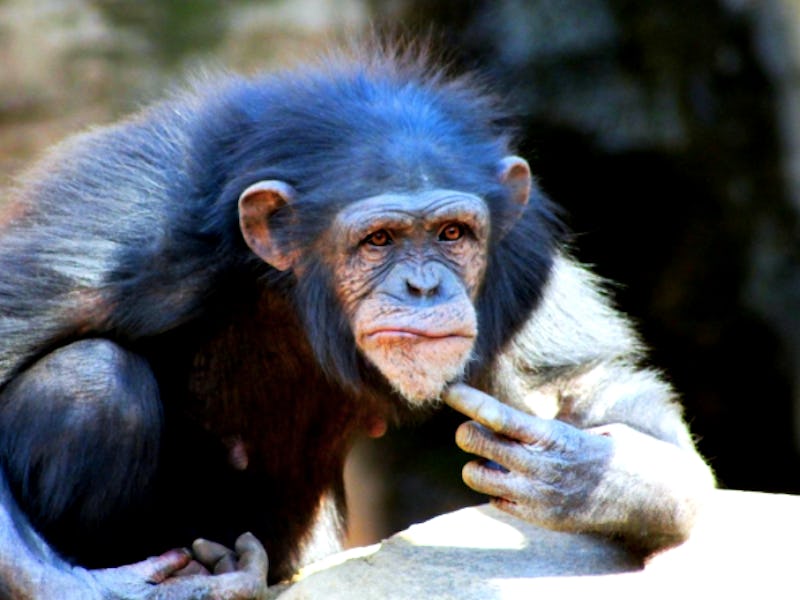Neuroticism Runs in the Human-Chimp Family, Primate Personality Study Shows
Deeply human traits are present in our closest primate relatives.

Humans and chimps share a common ancestor that lived between six and eight million years ago, a familial connection that means we share 98.8 percent of our DNA with our fellow great apes. Our genetic connection to chimpanzees is so great that some scientists have proposed they should be classified within the genus Homo, and a growing number of studies show they’re just like us, caring for each other, practicing death rituals, and taking revenge on their enemies.
Now, a new study confirms what’s perhaps the most human-like chimp characteristic of them all, supporting what Jane Goodall proposed during her time in Gombe National Park: Chimpanzees share many personality traits with humans, ranging from excitable and helpful to vulnerable and neurotic.
On Tuesday, scientists from the Scottish Primate Research Group reported in the journal Scientific Data that this study will hopefully lead to a “better understanding of the evolution of personality in chimpanzees and other primates” because animal personalities are increasingly being understood as products of natural selection.
Chimpanzees are among our closest living relatives.
The personality data were collected from observations of 128 chimpanzees, who either currently live or once lived in the Gombe National Park in Tanzania. Overall, the scientists were able to determine 460 personality ratings of 56 males and 72 females. The data were predominantly taken from recent observations of the chimps, while 24 of the personality profiles were based on the ratings of chimps assessed in a 1973 study. The same distinct personalities were observed both in the present and in the 1973 study, confirming their accuracy.
The actual observations were made by Tanzanian field assistants who filled out questionnaires originally designed to study personality in captive chimpanzee populations; here, they were used to assess wild chimps. Only a small number of primates have been studied demonstrating personality traits in the wild.
“What’s exciting about these data is there’s some suggested that wild apes look very similar to what we would expect in terms of basic disposition traits and continuity of those traits — and I don’t mean just to captive chimpanzees, but to humans,” Robert Latzman, Ph.D., a neuropsychologist unaffiliated with the research, told The New York Times. “The work in the wild underscores how similar these animals truly are to humans.”
Chimp personality traits strongly overlap with humans.
In the Hominoid Personality Questionnaire the Tanzanian field attendants filled out, chimps were evaluated for the Big Five personality traits in humans (extraversion, agreeableness, openness, conscientiousness, and neuroticism) and subset traits within these groups, like inventiveness and coolness. The researchers found that chimps consistently demonstrated these human personalities: For example, among most chimps, there was a positive association between aggressiveness and neuroticism, just as neurotic humans typically display anger and hostility.
The study authors write that they hope other scientists continue their research and that long-term studies of wild chimps eventually become “a rich source of insight into the evolution of human personality, and behavior more generally.”
While it’s becoming more accepted in the scientific community that many animals, from spiders to squids, have personalities, the reasons why a range of personalities persist in these species remain a mystery. The working hypothesis is that different personalities allow “targeted selection” to take place: Certain personalities continue to exist because they’re evolutionarily advantageous while other types are less favorable. The more an individual has to lose, the more cautious its personality — meaning that all those neurotic chimps are probably a lot like neurotic humans, worried about what out there in the world is going to get them.